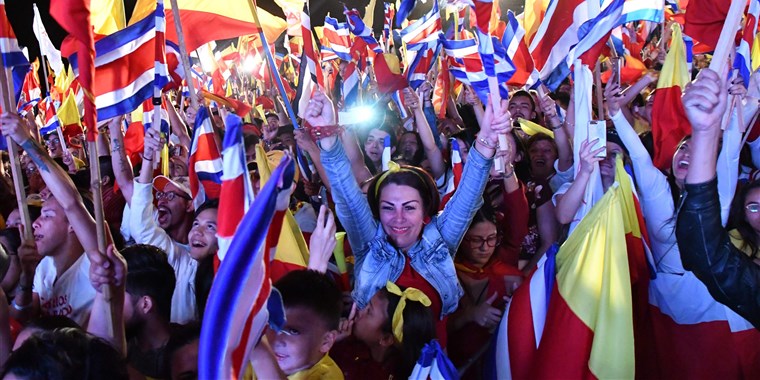Costa Rica News – Waking up Sunday morning, one thing was sure: A man with the last name of Alvarado would be elected the next president of Costa Rica by the end of the day. Carlos Alvarado Quesada and Fabricio Alvarado Muñoz (no relation) were neck and neck (or, as one says in Spanish, “elbow to elbow”) in the polls for the second-round presidential election.
Though the names were the same, the choice could not have been more consequential for LGBTQ couples in Costa Rica seeking to get married: The campaign had turned into an up-or-down contest over whether to legalize same-sex marriage. It also became a gauge of the political muscle of a loose, evangelical-led alliance of religious conservatives. As a result, a presidential election in this tiny country — a place where a little over 2 million votes in total would be cast — had become a key contest watched across Latin America.
More subtly, it had also become a critical test of the legitimacy of the Inter-American Court of Human Rights (IACHR). The IACHR had ruled on January 9, 2018, that Costa Rica must legalize same-sex marriage, a decision that in theory applied across Latin America.
Alvarado Muñoz, s Christian singer who had been polling around 3 percent before the decision, suddenly shot up in the polls by campaigning to reject the IACHR decision. He took first place in the first-round presidential election of February 4, unexpectedly beating out a candidate from the center-right National Liberation Party, which had adopted an ambiguous stance on same-sex marriage.
By bedtime Sunday night, supporters of same-sex marriage and the IACHR had reason to cheer. Alvarado Quesada of the center-left Citizen Action Party (PAC) resoundingly beat Alvarado Muñoz with 61 percent of the vote. Despite the infelicitous coincidence of the election date with Easter — which would normally have been expected to depress turnout — turnout actually ticked slightly upward from recent contests, to 67 percent.
What does the roller coaster ride of the past three months in Costa Rica mean for Latin America?
Most narrowly, Alvarado Quesada’s victory might signal the imminent legalization of same-sex marriage in Costa Rica. If so, Costa Rica will be far from a pioneer in Latin America. Latin America has been toward the forefront of the movements for same-sex marriage and LGBTQ rights. In 2010, Argentina became the second country in the Western Hemisphere, after Canada, to legalize same-sex marriage. Since then, Brazil, Colombia, Uruguay, and many states within Mexico have also come on board.
However, passing same-sex marriage in Costa Rica is still not a slam-dunk. The president-elect will need to negotiate with a highly fragmented legislative assembly. Leftist parties lost seats in the February 4 election of this year, while the evangelical National Restoration Party rose from one to 14 seats (out of 57 total). It’s no wonder Alvarado Quesada announced in his victory speech, “My duty is to unite the country.” In the short term, he’s likely to prioritize national infrastructure projects in the lead-up to Costa Rica’s 2021 bicentennial.
More broadly, Sunday night’s win provides the IACHR a narrow escape from a showdown that could have gone badly. Political scientist Gregory Caldeira notes that high courts control “neither the purse nor the sword.” Instead, they rely on the goodwill and confidence of other political actors who must choose to abide by their decisions.
As a result, even in a country such as the United States, with its powerful and much-esteemed Supreme Court, scholars are preoccupied with measuring the legitimacy of the court. A plain refusal by Costa Rica to accept the IACHR’s ruling would have made apparent the court’s toothlessness. This might have effectively nullified the court’s recent ruling with respect to same-sex marriage — if even the country that brought the case refused to abide by the decision, why should any other country in the region?
Even more dangerously for the IACHR, setting a precedent of flat-out rejecting court decisions would have weakened the court going forward. The court’s current docket contains important cases regarding state-sponsored human rights violations — for instance, related to extrajudicial executions in Venezuela and sexual violence by Mexican police. Surely states will be tempted to reject court decisions on behalf of victims in such cases.
Finally, the events of the past three months reveal both the potential and the limits of evangelical activism in Costa Rica. According to the 2016 AmericasBarometer, 26 percent of Costa Ricans identify as evangelical or Pentecostal. Yet until the 2018 elections, in which the National Restoration Party took 25 percent of the legislature, evangelical parties had never received more than 8 percent of the vote in Costa Rica.
The February 4 election revealed that when issues such as same-sex marriage galvanize a coalition of evangelicals and other religious conservatives, Costa Rica’s evangelicals can become important political players. Still, the election results tell us that ultimately, it is not quite enough to win a presidential election just yet.
By Amy Erica Smith, Vox.com

